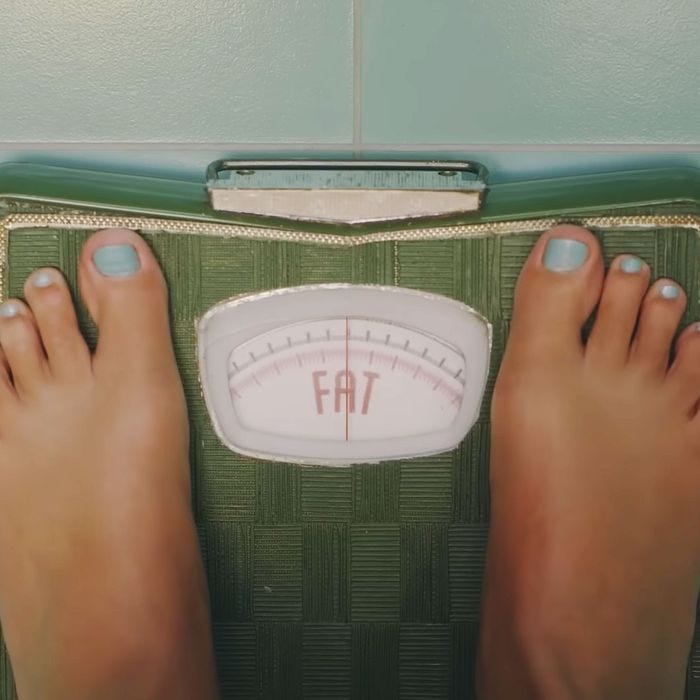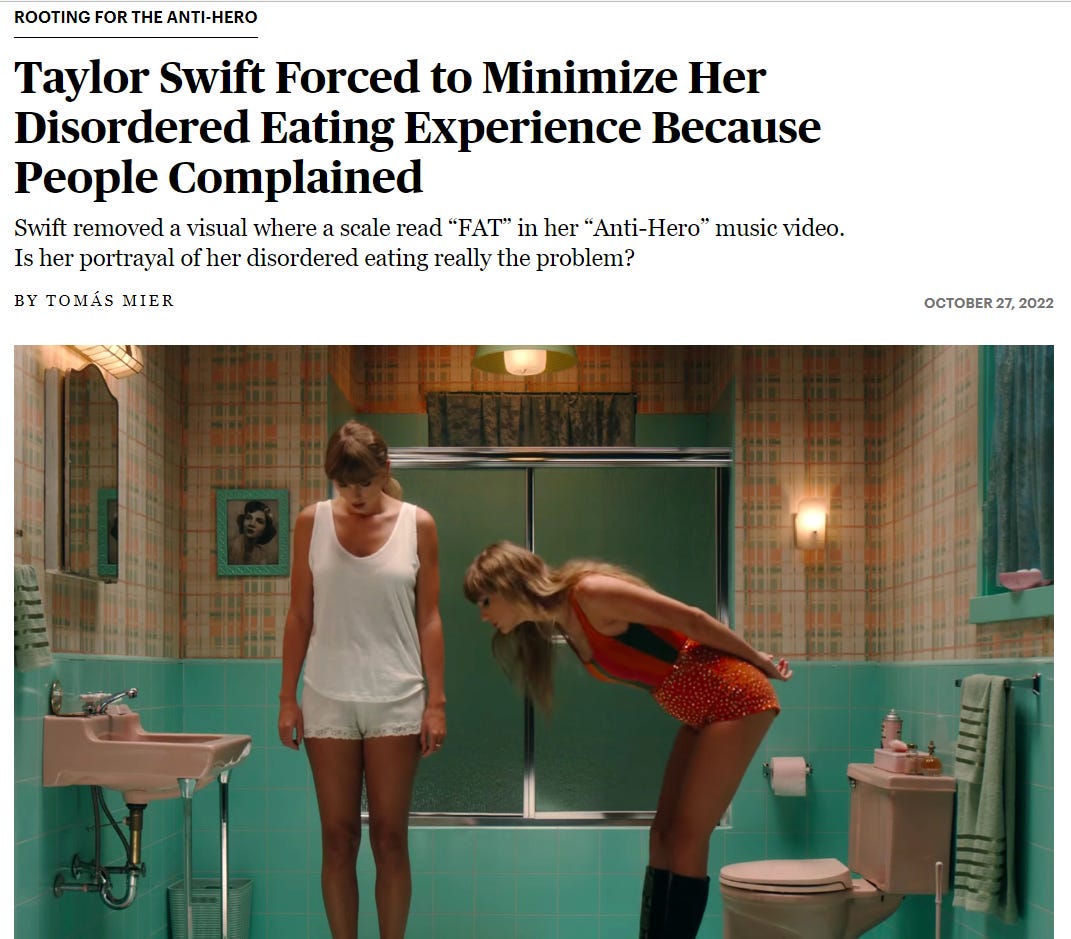it’s me, hi, I’m the problem it’s me
If you are a more productive person than me and don’t keep up to date on celebrity controversies, let me sum one up quickly:
Taylor Swift had (has?) an eating disorder. She recently released a music video called Anti-Hero about her insecurities, one of which is her body image. The video features a frame where she stands on a scale that simply reads “fat”. Some people defended it, some people were outraged, others were too tired to care. In the end, despite being someone who rarely apologizes or even addresses controversy, she removed the scene. The video’s message is almost entirely unchanged, and given her history it seems less likely she was “bullied” into silence and more likely she saw the criticism and thought it held water, but that doesn’t change the fact a certain subset of the population is outraged.
Rolling Stone said she “had to water down her artistic expression and how she chose to portray her lived experience with disordered eating because people found the use of the word “FAT” in her her “Anti-Hero” video offensive”. Now, I am not fat. I don’t (as of yet) know what it’s like to be fat, and it is not my place to comment on how this video affects fat people. However, (mostly thin) people calling this a crisis of free speech, a watering down of “artistic expression” feels pretty overblown given it’s a 2 second shot of a cotton candy coloured scale. But I don’t really want to talk about Taylor Swift.
Almost all the outrage I’ve seen in response to the criticism of the scene and it’s subsequent removal has boiled down to: “She’s not being fatphobic, she’s talking about how she sees herself. You’re silencing her because her mental illness presents in a problematic way.”
Now, usually I have a lot of sympathy for the argument that mental illness can make us act in ways that we’re not proud of, that society frowns upon, and we should be able to talk about those things without being seen as evil or immoral people. I feel largely the same way when it comes to Eating Disorders. But here’s the thing about Eating Disorders—a lot of what eating disorders tell us to do isn’t frowned upon by society. It’s not anti-social to say you don’t want to be fat. We go out everyday into a world that tells us the exact same thing. There are plenty of ugly aspects of EDs that society isn’t willing to hear about (and if Taylor was being asked to cut a scene of her purging or some other less glamourous symptom I’d be one of the ones advocating for the scene to remain). But simply stepping on a scale and not wanting to be fat is not one of them.
No one is trying to silence women like Taylor Swift from talking about their eating disorders. She is the platonic ideal of an eating disorder sufferer—a beautiful, thin, white woman who tragically thinks she’s fat. To comfort her we don’t have to subvert any social structures or challenge any norms. We can keep our judgements and prejudices about fat people just as they are, because we don’t have to tell her that being fat doesn’t make her bad or unworthy. We just have to tell her she isn’t fat at all.
“To thin people, the worst imaginable consequence of toxic body standards is someone who isn’t fat thinking they are fat” -@morethantracyt
Eating Disorders are pretty uniquely enmeshed with society because the line is so blurred between what’s desired vs disordered. We encourage people to diet, to exercise. We tell them to equate thinness with health, and to equate fatness with all manner of sins. Most people with restrictive disorders get positive feedback at first. People praise your discipline, your care for your health. They ask if you’ve lost weight, they say you look great. Especially for those of us who grew up in the 2000s during the peak of diet culture, the line where people stop praising and start worrying is almost impossible for determine. It’s a very appealing disorder in that way. There’s a reason so many of us are drawn to this way of thinking, and why so many of us are so reluctant to acknowledge that we can be upholding these standards even as they are killing us. It’s complicated.
I was proud of the fact my behaviour at 17 was self destructive. It wasn’t until I got older that I realized I hadn’t been a martyr but a suicide bomber. All of the things I was doing to hurt myself hurt those around me. Every single one.
I think it’s hard for some of us who have self esteem issues and disordered eating to admit that these things are rooted in beliefs that hurt everyone because they feel so uniquely self destructive, so personal and intimate. We are trying to fold into ourselves so much we eventually disappear. The trouble is we rarely end up doing that as gracefully as we think. We always go down kicking some way or another.
Eating disorders are about more than looking good. It’s not a disease of vanity, it’s a disease of discipline, or of punishing a lack thereof. We need control, and we can’t get it, for one reason or another, so we try to seize control by starving ourselves or punish ourselves for our lack of control with binges and purges. Food is a luxury, and it is a vice. If we can’t deprive ourselves of it, we will at least deprive ourselves of enjoying it. We might restrict it, turn it into something laden with so much weight and severity that eating feels worse than starving. Or we might let it suffocate us. If the binge itself isn’t punishing enough, if we manage to get some enjoyment from it, then we can drown ourselves in the shame instead. We are always drowning or starving to keep ourselves from screaming.
Either way food becomes something much bigger, something meaningful and symbolic, and when people don’t treat it with the same reverence and fear we do it makes them seem shallow. They don’t have our discipline, or at least not our depth. Someone comfortable in their body, someone in a happy relationship with food, that person is a threat to our worldview. Their existence tells us there’s another way, a way to be happy, and that is antithetical to our religion of suffering. We try to channel the envy into pity, or if that fails we let it fuel us, driving us deeper into our hole. Another brick in the wall we’ve built between us and the world. Even more than control, EDs are about isolation.
When I see people say “I’m not fatphobic except for myself”, which I’ve seen a lot, especially on tiktok, I don’t ever believe it. Because everything we hate about ourselves is something we are hypersensitive to. When I had braces I felt like they were the most visible part of my face. I saw everyone’s braces first because I thought that’s how everyone was looking at me. Now I don’t have braces I don’t notice if someone has them or not, but for a while (even though I’d never admit it) I thought they made everyone ugly because I thought they made me ugly. When my braces came off and I still felt ugly, I fixated on my weight. I’d never noticed my friends’ bodies before, but once I’d turned a microscope onto my own I couldn’t help but catalogue those of everyone around me. The time in my life when I was most victimized by diet culture and toxic body standards was also the time I was most strictly upholding them.
If you are spending so much time and energy assigning moral value to your own weight you’ll will inevitably end up doing it to someone else’s. Not as extremely, but somehow. You’ll catch yourself thinking, “I’d die if I looked like that”. You hate yourself for thinking it, you say you don’t really believe that, and you probably don’t (or at least don’t want to). But whatever we poison ourselves with eventually leaks into the groundwater around us and gets to everything we know and love. We’re social creatures, for better or for worse. I don’t think there’s a way to self destruct without collateral. If there is, I haven’t found it yet.




"We can keep our judgements and prejudices about fat people just as they are, because we don’t have to tell her that being fat doesn’t make her bad or unworthy. We just have to tell her she isn’t fat at all" BARS so much of the unnuanced/unhelpful eating disorder discourse I've been exposed to has been absolutely avoiding the acceptance of fatness and it makes it so much more difficult to move past needing to look skinny to feel worthy
so beautiful, love your voice in this. speaks on the eating disorder experience in a such a raw way. the experience of being hypercritical of others bodies when you're relapsing/bad is something so real to me, that too causing me individual personal shame, that i find so much comfort in hearing someone else has felt the same thing.
thank you for thus